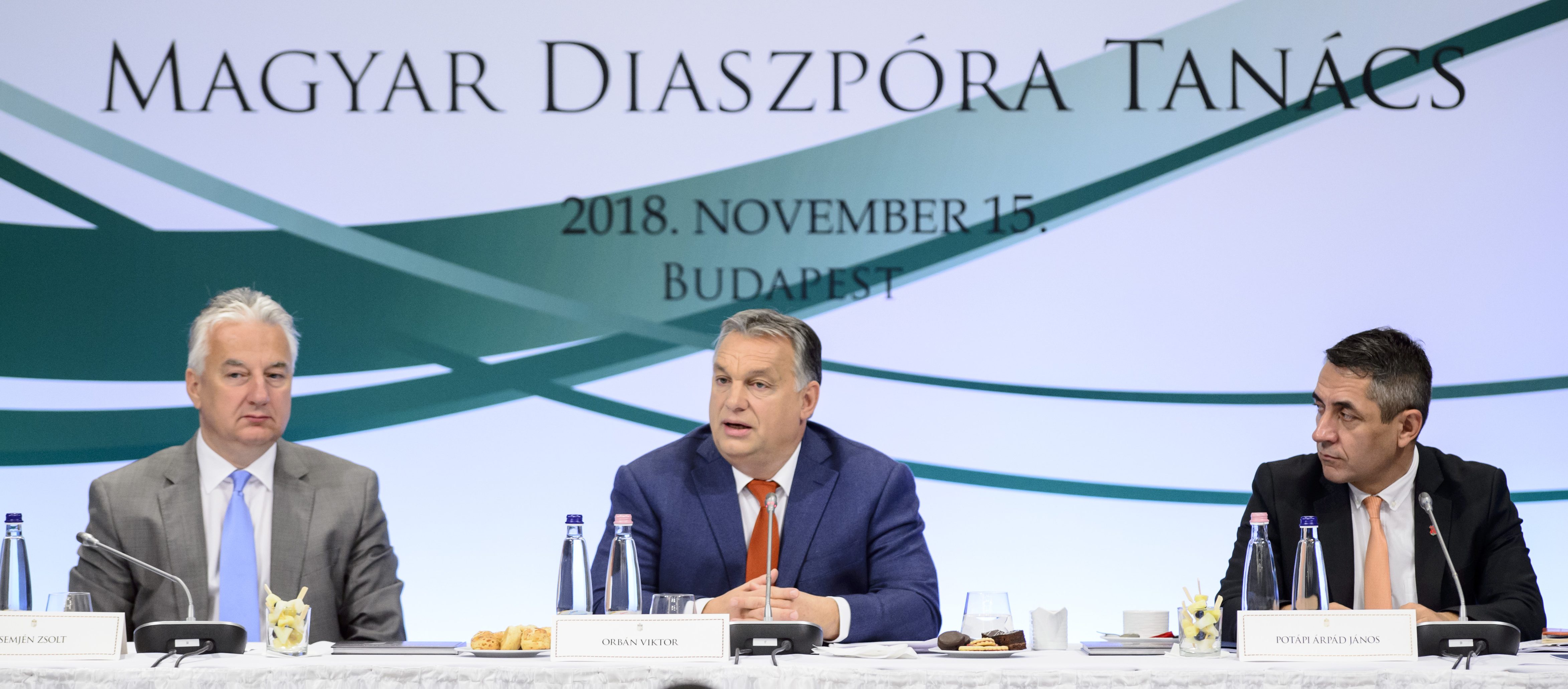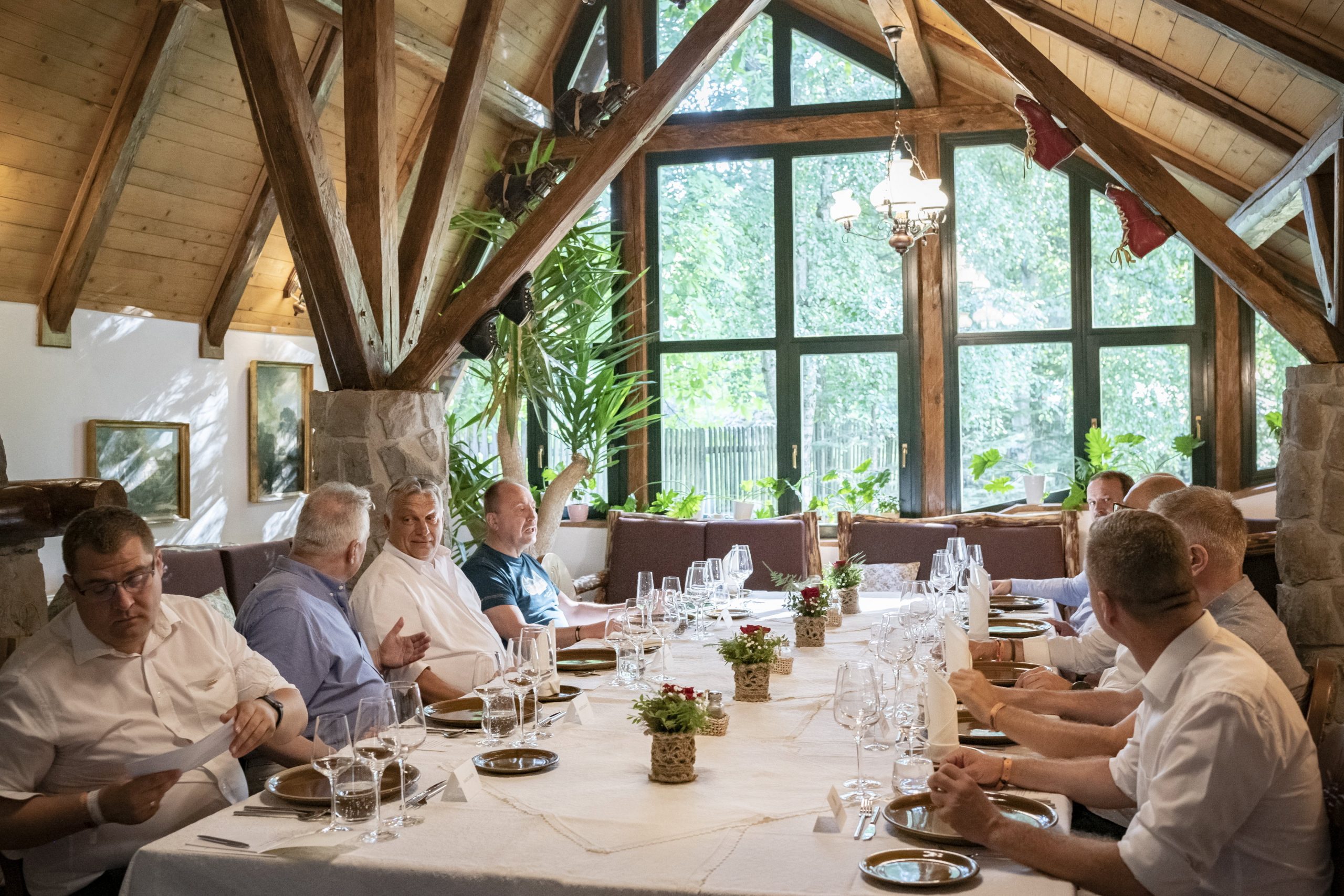
Mr Orbán drew attention to the fact that the volume and value of German-French trade only reaches 50 per cent of the volume of trade between the V4 and Germany “which is unprecedented”. Therefore, in the Prime Minister’s view, in the case of the volume of trade the Central Europe-Germany axis is more significant than the German-French economic axis.
“We are living our lives in a historical process when Central Europe is about to join the German economic force in a most decisive manner, both power-wise and economically”, he said. He pointed out he had mentioned earlier that in the coming years Central Europe, and the Carpathian Basin in it, would be the engine of European economic growth.
He said it is important that they create the cultural background for Central European cooperation as well as for acting as a common economic and political factor. In this context, Mr Orbán also spoke about the fact that the accession of Montenegro, Macedonia and Serbia to the EU will be an important momentum in the geopolitical rise of Central Europe. He described the reunification of the Balkans as an EU, Central European and Hungarian interest all at once.
Regarding Hungarian-Croatian relations, Mr Orbán spoke about the Hungarian oil industry company Mol’s problem, pointing out that so far he has pursued a strategy at talks held at the level of prime ministers whereby he regards the Mol dispute as an economic and company dispute, rather than as an inter-governmental issue.

“I sought to explain to them that if we elevate the Mol problem to the level of Croatian-Hungarian interstate relations, that will justify more robust action on the part of the Hungarian State, and that will immensely deteriorate Croatian-Hungarian relations”, he said.
Company-level legal conflicts must be investigated, this is what international courts are for, and the Hungarian government will accept the decisions which will be adopted by those courts in the interest of the settlement of the situation, Mr Orbán said.
“We will not raise (the dispute) to the highest level, not even if in one branch of the proceedings related to Mol they have also instituted a procedure – which Hungary was not aware of – which (…) personally involves a great many members of the Hungarian business elite; given that the most prominent and internationally acknowledged players of the Hungarian business elite are on Mol’s supervisory board, or one body or another of the company, and a general procedure has also been instituted against them, except there is no progress in the case”, he added. At the same time, the Prime Minister said that he will travel to Croatia for an official Croatian-Hungarian interstate meeting at the beginning of December. He expressed hope that it will be possible to continue the extensive cross-border economic development programme in Slavonia in Croatia and in South Baranya in Hungary.
Regarding Slovenia, Mr Orbán said this is the first time he has encountered the situation that a comedian, “a local Fábry” was elected as a country’s prime minister. He indicated at the same time that the Slovenian prime minister stands his ground flawlessly at every international forum. He also observed, however, that Marjan Sarec represents a different line on the issue of migration than Hungary; he supports the UN’s migration compact.
He also said that though Hungary would have liked it, it will not be able to take part in the development of the Port of Koper and the extension of the railway line leading there. Therefore, the Hungarian government will put Koper “on hold” on the issue of access to the sea, and will seek port acquisition and project talks in Trieste.

Speaking about Western Europe, he said “West of Vienna the situation is hopeless demographically” as the consequences of the acceptance of multiculturalism have induced almost irreversible sociological processes in major cities situated West of Vienna. In his view, it will be spectacular when the structure and order of political representation change in large cities in Western Europe.
Mr Orbán finally observed in connection with the one hundredth anniversary of the end of World War I that they have prolonged World War I commemorations by two years, and so they will extend to the Trianon anniversary.
Analysing the economic development programmes conducted beyond the borders, he highlighted in the context of Transylvania that there is no point in launching economic development programmes only for the state exercising supreme power in the country to retaliate afterwards against businesses receiving grants. He therefore asked the parties representing Hungarians in the given areas – and he will continue this line also in the future – to conduct negotiations with the majority state in order to reach the agreement that is essential for the continuation of Hungarian economic development programmes.
These are making good progress; according to calculations, each forint that is spent on economic development programmes in territories beyond the borders results in an HUF 2 GDP increase. In his view, they are doing well, but they do not really know how to handle political instability in Romania. They have to rely on the wisdom of the Democratic Alliance of Hungarians in Romania (RMDSZ) and other Hungarian political organisations in determining when they should conclude which agreements, but in this process they never intervene.
He also said that on the occasion of the EU “charade” against Hungary, the party of the Romanian Speaker of the House voted in favour of Hungary, against the proposal, in the European Parliament, despite the fact that its representatives form part of the liberal European party group. This is a fact that must be taken into consideration when building relations, Mr Orbán pointed out, indicating that when Romania was “slapped” with a parliamentary resolution in Brussels this week, all Hungarian government party MEPs voted in favour of Romania, meaning that they returned the political support and gesture. “A gentleman is not a scoundrel, the Hungarian government follows this principle”, the Prime Minister said.
Cooperation between RMDSZ and the other Hungarian parties is making some progress, against the background of “the usual kicking under the table”, Mr Orbán said evaluating the situation.
Speaking about next year’s EP elections, with reference to the changes enabling citizens who have no residence in the EU to vote, he highlighted that the EP elections are not party elections, but pan-Hungarian elections. We have a certain number of representatives in the European People’s Party, and there are Hungarian organisations beyond the borders which also form part of the People’s Party. The votes of their representatives can be combined with the votes of Hungarian MEPs for the purpose of enforcing common interests, the Prime Minister said.
He also said that there is good cooperation with historical churches, and it has been a long time since Hungary last had the financial strength to provide grants promoting Hungarian identity policy on a long-term basis in Transylvania.
He informed RMDSZ and the other two Hungarian formations that at its Wednesday meeting the Hungarian government discussed the issue of compossessoratus (indivisible property), and is ready to conduct consultations.

Regarding Upper Hungary, he said there is a thorn in their side, “a thorn in the shape of a Bridge (Most-Híd: bridge in Slovakian and Hungarian, an inter-ethnic political party in Slovakia)”. He added that the Hungarian-Slovak party does not present a problem in its specific existence; their problem is of a structural nature. Mr Orbán highlighted that the existence of the mixed party of Upper Hungary raises the issue of whether there should be ethnically organised parties in the region, or it is more expedient to form mixed parties. It is dangerous to change over to mixed political representation, it is a trap, it should be avoided, the Prime Minister suggested.
In Serbia they have been building an “unprecedented story” for many long years: they are seeking to elevate Serbian-Hungarian relations to a strategic level. The Prime Minister spoke in terms of praise about the gestures made by the Hungarian and Serbian presidents in the interest of historical reconciliation. This has opened quite a few doors, and there is good communication via those doors, he pointed out. We would be happy if the Serbian legal regulations were general in the entire Carpathian Basin; cultural autonomy has been effectively realised, Mr Orbán said.
He said regarding Ukraine that it is a difficult story, and while he does not like to use demeaning adjectives in connection with the elected leaders of other states, the truth is that “we are not making progress with the Ukrainians”. He highlighted: “we come to an agreement on Monday, and on Tuesday they claim that there was no agreement of any kind”. This is unprecedented in his experience. There is no basis of credibility to take negotiations seriously, Mr Orbán said.
He pointed out that the ever new draft proposals are creating an ever worse situation, and the open deployment of Ukraine’s secret services against Hungarian and presumed dual citizens is beyond the limit that is generally accepted in the Carpathian Basin.
Hungary can do one thing, has done that and will continue to do it ever more emphatically: it is making it clear that if there is a way at all from Ukraine to NATO and the EU, it only leads through Hungary and Budapest, he laid down.
As there will be presidential elections next year, they are beginning to establish relations with those who may play a role in politics after the elections, meaning that they are beginning to prepare for the post-elections era, Mr Orbán indicated.

